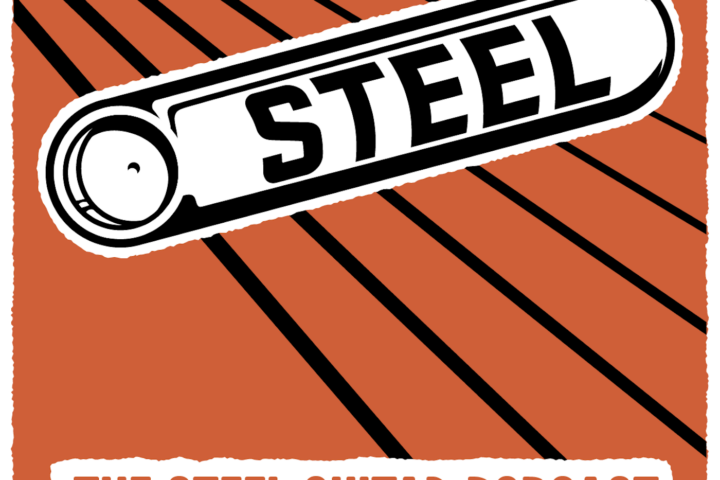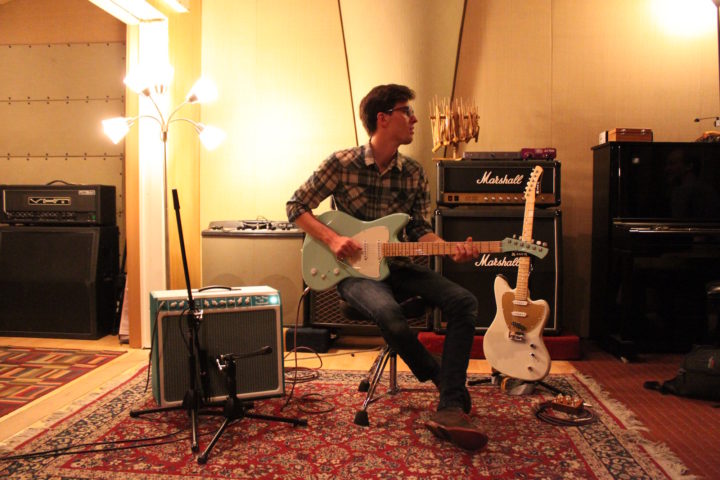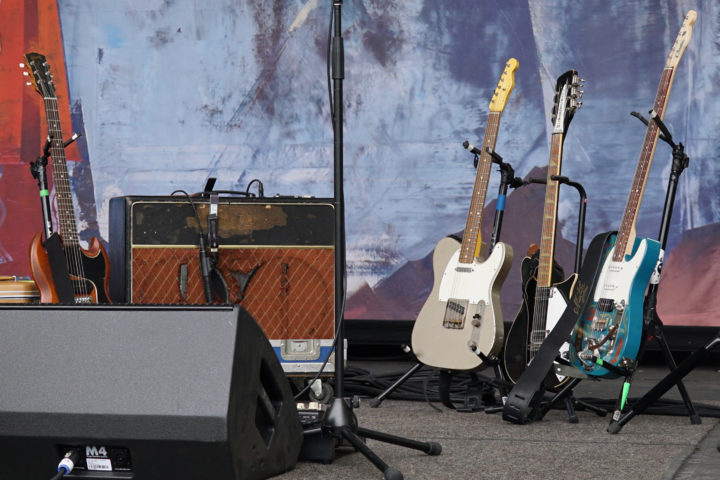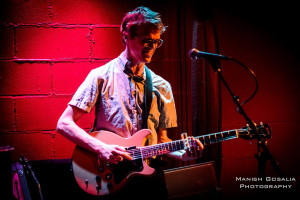
Six Strings from Stardom is a new column on fretboardjournal.com where we interview some of the unsung heroes of the guitar world, the hard working session and touring musicians. In our first installment, we talk to Los Angeles’ Rich Hinman, a guitarist who has played alongside Sara Bareilles, Rosanne Cash, Marc Cohn, Cyndi Lauper and others. Hinman also has one solo album under his belt, Glacier, which was released in 2014. The FJ’s Ryan Richter asked him about his music background, his love for the pedal steel and more.
Fretboard Journal: When did music start for you?
Rich Hinman: I started playing piano when I was six or seven, which basically consisted of studying the basics in the first of the Alfred’s piano series, which I continued for a few years in spite of the fact that I really didn’t like it all that much. That said, I had weirdly strong sense through that whole time that I knew I wanted to be a musician, so I kept at it, even though I was basically doing everything I could to not practice. Then I started playing classical guitar at around age nine, mainly because my parents didn’t really know of a teacher in Sleepy Hollow that was capable of teaching any other style, so I did that, learned to read, stuck to the program and was making steady progress, but it was the stuff I was trying to figure out on my own that really got me in to it and that’s when I knew that I was really going to do this.
Looking back on it, I can see that that decision I made, to really do music was in large part, and this is sort of embarrassing to say, conjured up by my fascination with hair metal. The absurd iconography of it all, the way it basically dominated MTV, and the fact that the guys in those videos were clearly having a way better time than anyone else, and all because they were playing loud rock music.
The more I played, the more I knew I was getting closer to something really cool, and then when music actually really started to click for me, then I was open to being truly compelled by music of all kinds. When I moved from the nylon string student guitar that my parents rented for me to my first electric guitar (a Charvel 1A), I was all in.
FJ: Can you remember the first song you learned that made you feel like you were starting to make real progress on the instrument?
RH: That’s a little hard to say, but I can remember really freaking out the first time I heard Led Zeppelin IV. I’d never heard anything remotely that good. The fact that the record starts with “Black Dog” which is so obviously amazing, it all just really blew my mind. I guess that might be the first song I learned that got me really excited, but I realize now that I was playing it wrong back then. Most of the classical material I studied was in first position, so I learned a few rock songs in that part of the neck, which now I realize made things a little more complicated than they needed to be, but I ate it up.
FJ: Fast forwarding a bit, what was happening for you musically during your teens and twenties?
RH: Well, I went to a Catholic high school where the music program was basically non-existent. There was one teacher who got kids together my freshman year and we ran through tunes, which was great but it didn’t last long. I did have some really great teachers growing up, because I went to the National Guitar Workshop in Connecticut, which was amazing. I also studied with a guy in New York named David Hamburger who now lives in Austin. He exposed me to some really great music that I wouldn’t have otherwise known about then, like Jimmy Bryant, stuff like that.
When I was 17 I got the chance to study with Wayne Krantz, and that was really great for a few reasons. The first was that even though I was pretty comfortable with the guitar at that point and very much dedicated to the idea that it was something I was going to really pursue, the fact of the matter was that I really hadn’t actually played with people all that much. I didn’t have much experience adapting what I was doing to other people’s playing, and it didn’t take Wayne very long to zoom in on that. In so many words, he told me that my time sucked, and to be fair, I’m sure that at that point it did. That was a revelation to me, because before then I honestly hadn’t really given the idea of time very much thought. We’d be playing standards, and he was really great about honing in on my comping as needing to be every bit as well executed and should get as much consideration as any melody or solo I’d play. As a 17 year old, some of that stuff was pretty hard for me to hear, but I’m glad he was as honest as he was. Looking back on it, he was basically the only person that was bringing those issues up with that level of candor. I only took six or seven lessons with him, but I still think about them all the time.
FJ: When did you start playing pedal steel?
RH: I started with steel around 2006, and it really changed everything for me. I was playing in a band in New York called The Madison Square Gardeners. We were a band that led something of a double life in that we were writing and recording original songs and playing normal 45 minute sets around town with that material, but we were also playing true bar gigs where we’d play from 9:00 p.m till 3:00 a.m. Through that, I got to play a ton of pedal steel and that’s when it started to really come together. People that I admired would come sit in, we had to know a ton of material, and the band was just really great all around. I was really motivated to learn parts, be creative in how I’d work ideas in, and most importantly how to really play with people. I was doing a bunch of other stuff in New York at that time too, but that band was really important for me because of how much I grew so much while I was in it.
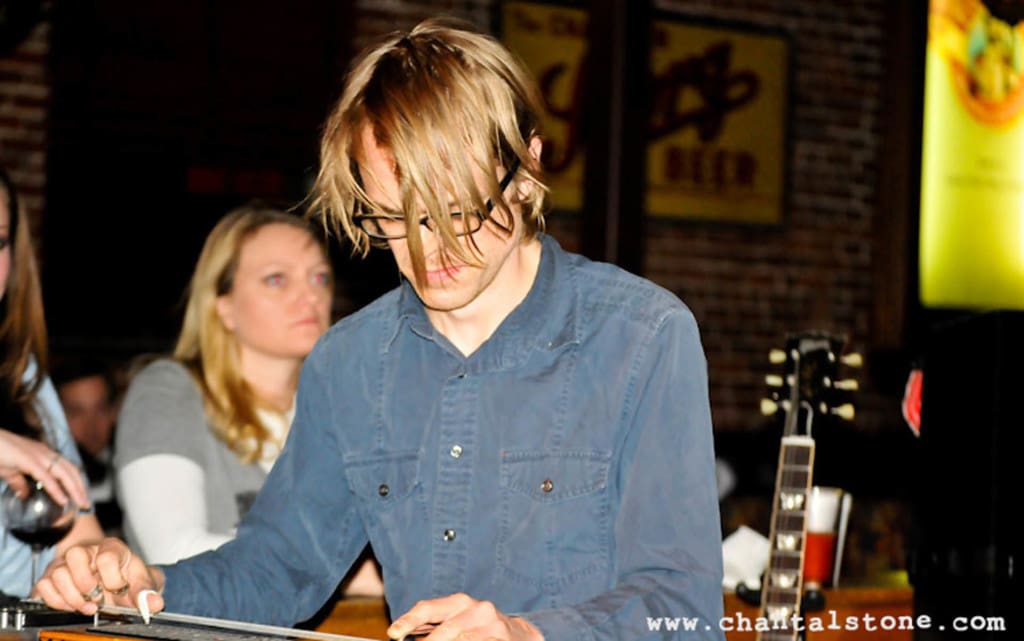
This is a caption!
FJ: You’ve played for some impressive people over the years. What are some of the standout sessions?
RH: That’s a tough one. There’s always so much to take away from different playing scenarios. I’ve been lucky in that a lot of my work as a touring musician has given me such a wide range of experiences. In Ben Kweller’s band, I ended up adapting a bunch of songs that were otherwise very downstroke heavy guitar pop rock songs into being played on pedal steel, which was a total blast. In Rosanne Cash’s band, it was just being around her band, which is made up of a bunch of really incredible players, such as John Leventhal. Playing in Sara Bareilles’ band is amazing because I get be part of something that the fans are so visibly affected by. People go crazy for it, and it’s so amazing to see from the stage! It’s such a different thing playing in huge places, and to a certain extent, I’ve almost had to relearn what it means to be a band member and contribute in a tasteful way. It’s such a strange challenge, trying to create meaningful and organic musical moments happen when your amp is 70 feet away from you. It can feel like going back to first base sometimes, but in the best possible way. -Ryan Richter
![dawb-six_that_get_you-600x600[1]-3](https://www.fretboardjournal.com/wp-content/uploads/2016/07/dawb-six_that_get_you-600x6001-3.jpg)
